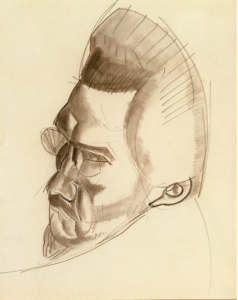Wyndham Lewis (1882-1957), Portrait of Ezra Pound (1920)
Ezra Pound was well-known as one of the most controversial poets of his time. He, along with Wyndham Lewis, was a leader of the vorticist movement, a mode of artistic expression that has its roots in imagism. As implied by its name, the aim of imagism is to convey clear images without requiring embellishment. This work in particular provides interesting parallels with Pound’s writing style; it is a simple sketch, with no color or elaborate designs to distract from the form. The forceful, striking lines in Portrait of Ezra Pound mirror the short, impactful, and oftentimes harsh phrases that can be found in Pound’s literary works — and also work to emphasize the influence of futurism on Lewis’s work, despite Lewis’s detestation of being associated with futurist ideology.
Pound has written that “The idea that music and poetry can be separated is an idea current in ages of degradation and decadence when both arts are in the hands of lazy imbeciles.” His little-known musical output features unharmonized music, with sounds coming into play at random and arguably rendering the music in itself almost meaningless.
“It has been your HABIT for long to do away with true poets,
You either drive them mad, or else you blink at their suicides,
Or else you condone their drugs, and talk of insanity and genius,
BUT I will not go mad to please you.
I will not FLATTER you with an early death.
OH, NO ! I will stick it out,
I will feel your hates wriggling about my feet,
And I will laugh at you and mock you”
-“Salutation the Third” by Ezra Pound, directed at “The Times” – news entities and other such organizations that profited off of artists. BLAST Magazine (1914)
Pound reading his poem, “Cantico del Sole”
“Pound is bemoaning the lack of ‘culture’ in his native country, mocking his ordinary fellow Americans for their backwoods sensibility, deprived education, and barren provincialism at the start of the twentieth century.”
-“The Thought of What America,” John Gery
Categories: Cubism, Futurism, Male Perspective, Urbanism and Industrialism



